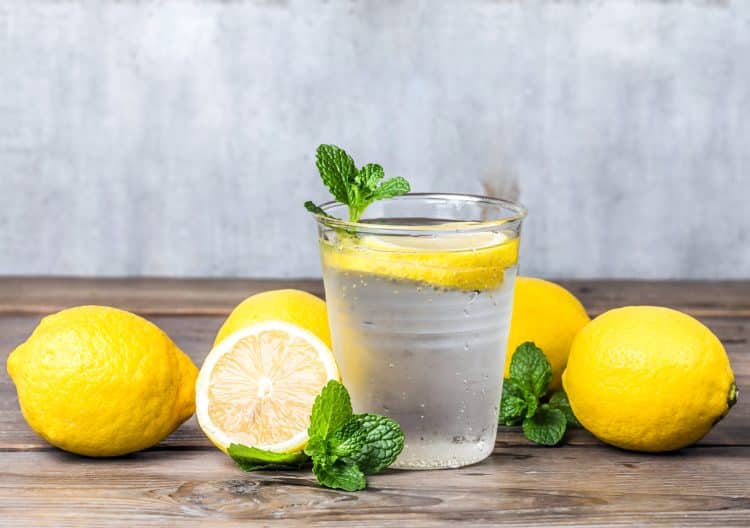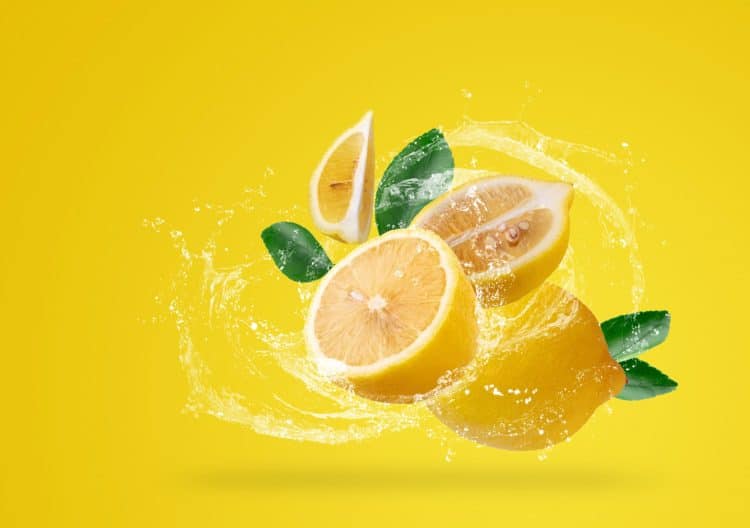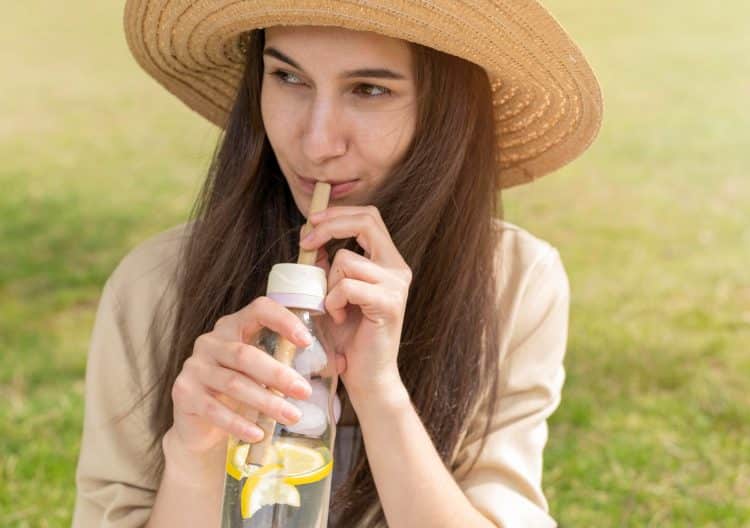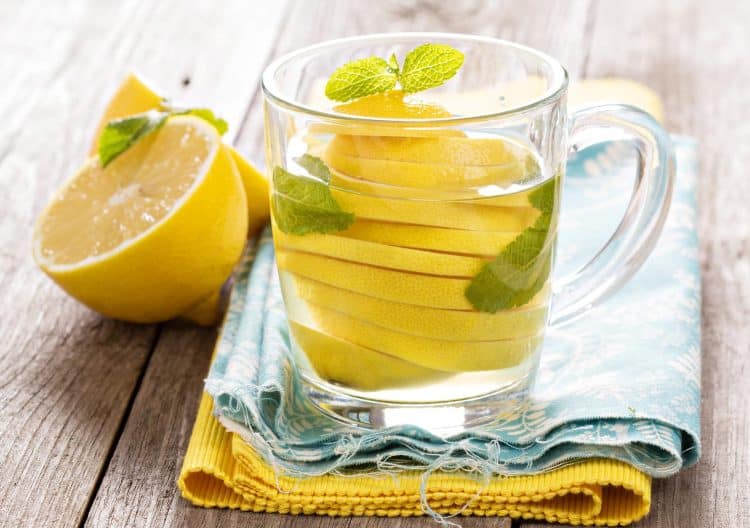Lemon water is often consumed by folks who fast regularly. But does it break your fast? In this article, we will evaluate lemon water’s benefits and side effects.
What is Lemon Water?

Water is mixed with lemon juice to make lemon water. However, the jury is still out on how much lemon juice is required to make one glass of lemon water and what should be the ideal temperature of lemon water to maximize its benefits.
Generally, these things depend on individual preferences. Some people infuse lemon water with lemon rind and other popular herbs to enhance its flavor and benefits.
Lemon Water Nutritional Information
Lemon water has excellent antioxidant properties, which help flush out “free radicals” from the body. Free radicals are our cells’ waste products when the body processes food and reacts with the environment. An accumulation of free radicals in the body can lead to oxidative stress, which might lead to serious health hazards like heart attack, cancer, arthritis, stroke, etc.
Lemons are a great source of vitamin C. One average lemon has around 48g of lemon juice. It contains about 18.6mg of vitamin C, which equates to almost 21% of a person’s daily vitamin C requirement. Aside from being high in vitamin C, lemon juice is low in calories and contains trace amounts of proteins, carbohydrates, fats, sugar, B vitamins, folate, and minerals.

According to the United States Department of Agriculture, here are the nutrient components in around 48g of raw lemon juice: [1]
| Calories | 10.6 | |
| Vitamin C | 18.6 mg | 21% of DV |
| Folate | 9.6 mcg | 2% of DV |
| Potassium | 49.4 mg | 1% of DV |
| Vitamin B-1 | 0.01 mg | 1% of DV |
| Vitamin B-2 | 0.01 mg | 1% of DV |
| Vitamin B-5 | 0.06 mg | 1% of DV |
| Iron | 0.038 mg | <1% of DV |
Does Lemon Water Break Your Fast?
Simply put, no, lemon water will not break your fast. For a better understanding, we must know what ends a fast.
Fasting is the voluntary act of abstaining from food. During a fast, you need to ensure that the insulin hormone is not triggered and the body stays in ketosis. To break a fast, you need to consume calorie-loaded foods or beverages. These result in an insulin spike in the body, resulting in the breaking of a fast.
A glass of lemon water contains approximately 10 calories. However, 10 calories are not enough to raise insulin levels, meaning the state of ketosis is maintained, and the fast stays intact. On the other hand, some studies suggest that drinking lemon water while fasting can help burn fat. [2]
Why is it Okay To Have Lemon Water During a Fast?
Lemon water is a low-calorie drink that does not trigger an insulin response and is safe to consume while fasting. A few glasses of lemon water is good for people who do not like to have plain water. Drinking lemon water during a fast can be beneficial as it promotes fat-burning and helps curb hunger.
Lemon water has a high vitamin C quantity. Drinking a glass of lemon water can help you meet your daily vitamin C requirement. Otherwise, you might have to use vitamin C supplements to fill the void. Furthermore, vitamin C has multiple health benefits, such as skin health, wound healing, and promoting stronger bones and cartilage.

Tips For Drinking Lemon Water During a Fast
Here are some common tips to get the best out of lemon water during a fast.
- Keep the temperature low: There is a common misconception that warm lemon water is good for fat loss. On the contrary, lemon water should be consumed at room temperature as adding lemon juice to warm water makes it lose its essential nutrients.
- Add a pinch of salt: Adding a pinch of sea salt not only accentuates the flavor of the lemon water but also helps reduce cellular toxicity. Salt also reduces the acidic nature of lemon water, which protects tooth enamel.
- Alternate lemon with lime: Substituting lemon water with lime water can break the monotony of drinking lemon water daily. Lime juice has trace amounts of vitamin A and calcium, which are beneficial for the body.
- One glass is more than enough: Lemon water must be consumed in moderation, especially while fasting, as too much lemon water can lower the gut pH to dangerous levels, which can cause heartburn and upset stomach.
- Drink with a straw: One of the most widely stated disadvantages of drinking lemon water is that it erodes weak tooth enamel. Drinking lemon water with a straw is advised to prevent contact with the teeth, and the enamel is protected from its acidic elements.
Types of Lemon Water To Consider
Given below are a few lemon water variants you should know about:
- Plain lemon water: Plain lemon water is a great substitute for water while fasting. Also, it is easy to make. Just add lemon juice to a glass of water, and you are good to go.
- Lemon herb water: Lemon water infused with herbs like fresh mint leaves can add a refreshing twist to this super healthy drink. You can muddle some fresh mint leaves in a glass and add lemon water. Additionally, you can add a pinch of sea salt to enhance the flavor further.
- Diet lemonade: Some people might not enjoy plain lemon water. For them, diet lemonade is a great option. Just add some zero-calorie sugar substitute like erythritol to your lemon water to make a delicious diet lemonade.
- Artificially-flavored lemon water: Nowadays, many different artificially-flavored lemon water options are available on the market. Ensure they are sugar-free and keto-friendly before consuming them.

Benefits of Lemon Water
The advantages of drinking lemon water include:
1. Boosts Immune System
Lemon water is a great vitamin C source with antioxidant immunity-boosting properties. Also, vitamin C has proven antibacterial and antiviral qualities, which protects you from sinus pain and sore throat. [3]
2. Prevents Skin Wrinkling
Having a glass of lemon water in the morning helps produce collagen, which is beneficial in preventing skin wrinkles. Also, vitamin C boosts skin health and quality by preventing acne breakouts. [4]
3. Prevents Kidney Stones
Kidney stones are accumulated waste products that crystallize over time in the kidney. Lemon water contains citric acid, which increases the urine volume and pH levels, and prevents the waste from crystallizing in the kidney. Hence, preventing kidney stone formation. [5] [6]
4. Prevents Anemia
Anemia is mainly caused by a lack of iron in the body. Although the body can easily absorb iron from meat and fish, iron from vegetable sources is difficult to absorb. The citric acid and vitamin C in lemon water help absorb plant-based iron, which is essential for preventing anemia. [7]
5. Reduces the Risk of Heart Disease
Studies suggest that vitamin C present in lemon water can help prevent heart disease and stroke. Additionally, the citrus fiber in lemons is proven to significantly lower heart disease risk. [8] [9]
6. Helps Weight Loss
Some studies suggest that drinking plain lemon water during intermittent fasting can help burn fat. Although the studies are not well corroborated, the water we consume makes us feel more satiated during fasting periods. [10] [11]
7. Improves Digestion
The most common fiber in lemons is pectin, a form of soluble fiber that aids in the digestion of certain sugars and starches and has antimicrobial properties. Consuming it can improve digestion and gut health, but you should drink lemon pulp to get the digestive benefits of lemons. [12] [13]
8. Decreases the Risk of Cancer
Some preliminary studies suggest that lemons contain certain plant compounds like limonene and naringenin, which might have certain anti-cancer properties. Some test tube studies suggest many plant compounds present in lemons kill cancer cells. Most of these findings are from a preliminary stage, and more research is required to support these claims. [14]
Lemon Water Alternatives
Some common lemon water alternatives include:
- Plain black coffee: Plain unsweetened black coffee can be a good alternative to lemon water. The caffeine present in the coffee can give you a much-needed boost while fasting for long hours.
- Green tea: Green tea is another great alternative to lemon water. Similar to lemon water, green tea also has certain antioxidating properties. People can add a slice of lemon to green tea to enjoy the benefits of both green tea and lemon while fasting. Check out the 12 best green tea brands here.
- Cucumber water: Infused fruit waters are popular in the fitness community. Fasting people can infuse water with cucumber slices to enjoy the cooling and refreshing effects of cucumber without any added calories.
- Salt water: Water spiked with a pinch of rock salt has various benefits and can be a great alternative to lemon water.

Frequently Asked Questions
1. Are there any downsides to drinking lemon water?
Drinking too much lemon water can erode teeth enamel since the citric acid in lemon water reacts with it. Also, too much lemon water on an empty stomach can lower the gut pH and cause gastrointestinal complications.
2. How much lemon water is too much?
For hydration purposes, two to three lemons per day are thought to be sufficient. And during the day, sip 2-3 glasses of lemon water at regular intervals. Consuming in excess must be avoided since it can lead to an upset stomach, heartburn, and tooth decay.
3. Should I drink lemon water diluted or concentrated?
Lemon water is safe when consumed in diluted form. It should never be consumed in a concentrated form due to its acidic level. Dilute it with water for efficiency.
4. Does lemon water break autophagy?
No, lemon water does not break autophagy since the calorific value of lemon water is low. It does not cause insulin spikes or affect your fast.
5. Will half a lemon break a fast?
No, consuming half a lemon while fasting will not break a fast.
6. Does drinking lemon water lead to metabolic change?
Drinking lemon water in the morning can boost metabolism, which in turn can lead to weight loss. Additionally, the presence of antioxidants and vitamin C supports healthy digestion.
7. Can we drink lemon water with honey in intermittent fasting?
Lemon water with honey has several health benefits, but consuming them while 14/10 intermittent fasting or any other fasting plan will break the fast as the calorific value of honey is pretty high. You can substitute honey with zero-calorie sugar to enjoy a sweet lemon drink without breaking the fast.
8. Can I put lemons in my water or green tea while fasting?
Yes, you can add lemons to water or green tea while fasting. Lemons do not break the fast and will add a refreshing twist to your water and green tea.
9. Is it harmful to consume lemon water during iftar (breaking the fast)?
No, consuming lemon water during iftar is not harmful. On the contrary, lemon water with honey is a nutritious and tasty drink.
10. Does detox water consisting of lemon, cucumber, ginger slices, and mint break an intermittent fast?
No, detox water made from lemon, cucumber, ginger slices, and mint leaves will not break an intermittent fast. It can be a great detoxifying drink while fasting.
11. If I add chia seeds and lemon into my water during fasting, will that hinder my weight loss or help it?
Chia seeds must not be added to lemon water while fasting as chia seeds are high in calories and will break your fast. Plus, consuming too many chia seeds can hinder your weight loss process.
Learn more about fasting
- 11 Best Intermittent Fasting Books in 2023 (Review and Ranked)
- 7 Day Water Fast: Your Journey to Rejuvenation and Wellness
- 6 Intermittent Fasting Juice Recipes: Sip Your Way to Success with These Tasty Recipes!
- Eat Stop Eat Intermittent Fasting Decoded: Master Your Metabolism & Lose Weight
- Intermittent Fasting for Weight Loss in Men — The Ultimate Guide
- Fat Loss vs. Weight Loss — Explained!
- Fruit Fasting: The Sweet Path to Wellness
- Foods To Avoid While Intermittent Fasting
- Does Cinnamon Break a Fast? Separating Fact from Fiction
- Does Honey Break Your Fast? — Unveiling the Truth
Final Thoughts
Lemon water as a drink while intermittent fasting is a great choice since it does not break your fast and offers multiple health benefits. It can be consumed in numerous ways by making drinks with other zero-calorie food items. However, you should be careful of the amount of lemon water you consume, as too much lemon water can have certain disadvantages too.
References
- “FoodData Central.” FoodData Central, fdc.nal.usda.gov/fdc-app.html#/food-details/167747/nutrients. Accessed 6 Oct. 2022.
- Dosoky, Noura S., and William N. Setzer. “Biological Activities and Safety of Citrus Spp. Essential Oils – PMC.” PubMed Central (PMC), 5 July 2018, www.ncbi.nlm.nih.gov/pmc/articles/PMC6073409.
- PMC, Europe. “Role of Vitamins D, E and C in Immunity and Inflammation.” Europe PMC, europepmc.org/article/med/23830380. Accessed 10 Oct. 2022.
- “Collagen Peptide and Vitamin C Additively Attenuate Age-related Skin Atrophy in Sod1-deficient Mice.” Browse Journals by Subject, www.tandfonline.com/doi/full/10.1080/09168451.2014.915728. Accessed 10 Oct. 2022.
- “Dietary Manipulation With Lemonade to Treat Hypocitraturic Calcium Nephrolithiasis – PubMed.” PubMed, 1 Sept. 1996, pubmed.ncbi.nlm.nih.gov/8709360.
- “Can Lemon Juice Be an Alternative to Potassium Citrate in the Treatment of Urinary Calcium Stones in Patients With Hypocitraturia? A Prospective Randomized Study – PubMed.” PubMed, Dec. 2008, pubmed.ncbi.nlm.nih.gov/18946667.
- “The Effects of Fruit Juices and Fruits on the Absorption of Iron From a Rice Meal – PubMed.” PubMed, 1 May 1987, pubmed.ncbi.nlm.nih.gov/3593665.
- “Citrus Flavanones: What Is Their Role in Cardiovascular Protection? – PubMed.” PubMed, 12 Sept. 2012, pubmed.ncbi.nlm.nih.gov/22574825.
- “Serum Vitamin C Concentration Was Inversely Associated With Subsequent 20-year Incidence of Stroke in a Japanese Rural Community. The Shibata Study – PubMed.” PubMed, 1 Oct. 2000, pubmed.ncbi.nlm.nih.gov/11022052.
- “Superior Antibacterial Activity of Integral Lemon Pectin Extracted via Hydrodynamic Cavitation – PubMed.” PubMed, 28 May 2020, pubmed.ncbi.nlm.nih.gov/32489768.
- Tejpal, S., et al. “Lemon Juice: A Potential Source of Angiotensin Converting Enzyme Antagonism for Weight Loss and Insulin Resistance | Proceedings of the Nutrition Society | Cambridge Core.” Cambridge Core, 5 Oct. 2018, www.cambridge.org/core/journals/proceedings-of-the-nutrition-society/article/lemon-juice-a-ptential-source-of-angiotensin-converting-enzyme-antagonism-for-weight-loss-and-insulin-resistance/0760DBD87463CF78991B31BCC5390781.
- “Water-induced Thermogenesis – PubMed.” PubMed, 1 Dec. 2003, pubmed.ncbi.nlm.nih.gov/14671205.
- “Effects of Dietary Fiber and Its Components on Metabolic Health – PubMed.” PubMed, 1 Dec. 2010, pubmed.ncbi.nlm.nih.gov/22254008.
- “Prevention and Therapy of Cancer by Dietary Monoterpenes – PubMed.” PubMed, 1 Mar. 1999, pubmed.ncbi.nlm.nih.gov/10082788.


